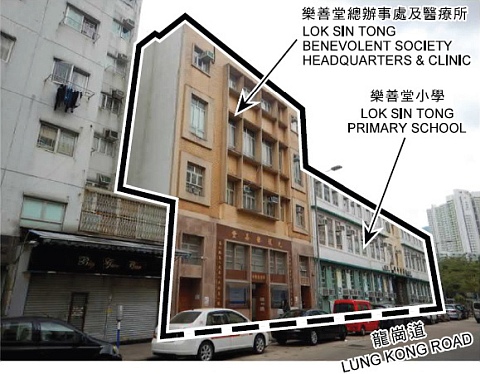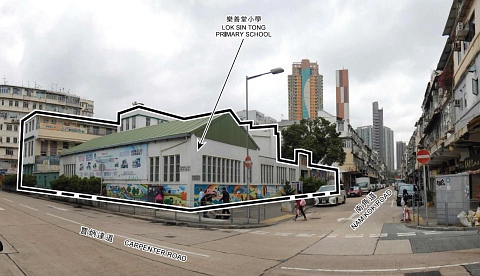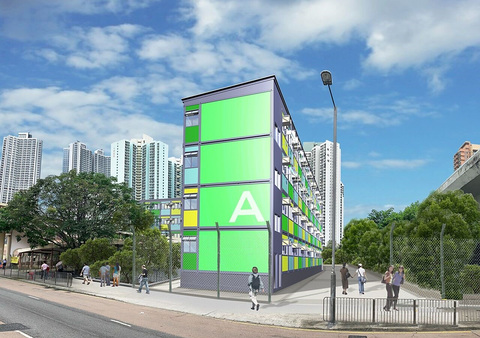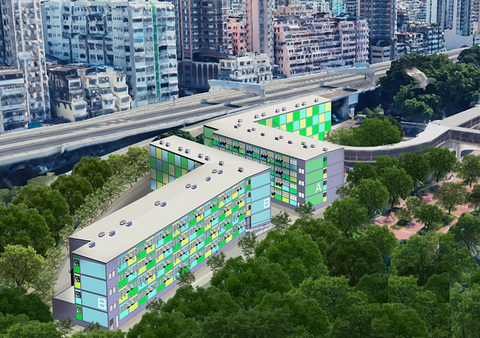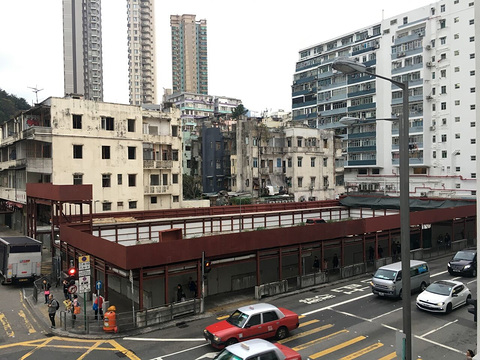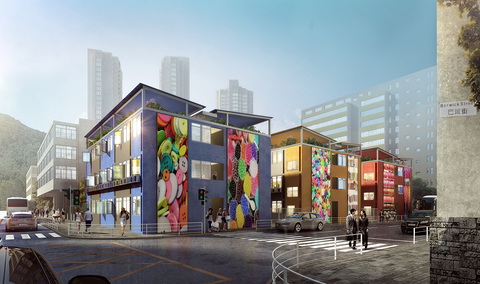Joint efforts to boost transitional housing to ease housing difficulties of grassroots
21 July 2019
Last Tuesday (16 July), the Commission on Poverty (CoP) chaired by me endorsed several important programmes for poverty alleviation, bringing some warmth to the current social atmosphere.
Two of the programmes to provide transitional housing will be allocated a total provision of about $113 million. The aim is to increase transitional housing supply by using the most efficient, economical and environmentally friendly methods, viz. converting idle non-domestic buildings (e.g. school premises) and adopting the technology of Modular Integrated Construction, so as to alleviate the hardship faced by families awaiting public rental housing (PRH) and other inadequately housed households.
Pilot Scheme on Subsidy for Conversion of School Premises for Transitional Housing - Lok Sin Tong Primary School
Lok Sin Tong Primary School, situated at 63 Lung Kong Road, Kowloon City, will cease operation on 31 August 2019. Lok Sin Tong is applying for the redevelopment of the school premises and the adjacent site for welfare purposes under the Special Scheme on Privately Owned Sites for Welfare Uses operated by the Labour and Welfare Bureau.
Actively supporting the Government’s policy of making the best use of land, Lok Sin Tong has agreed to convert the school premises pending redevelopment for use as transitional social housing. This is the first transitional social housing project in Hong Kong carried out by converting an idle non-domestic building (school premises). The CoP has allocated $13.04 million through the Community Care Fund (CCF) to subsidise the school conversion works under the pilot scheme1. The project is expected to last no less than three years in duration and about 50 transitional social housing units will be offered for rent to three- to four-person households, benefitting about 180 people altogether. Each housing unit will be provided with an open kitchen and a separate toilet. There will also be communal space, such as laundry rooms and family activity rooms. It is estimated that the conversion works will take about six months to complete and the intake of households will start in the first half of next year (2020) at the earliest.
Apart from accommodation, the pilot scheme will also provide community-based family support services, such as subsidies for medical expenses and after-school homework tutorial classes. By mobilising community resources and support, the scheme aims to enhance the beneficiaries’ life skills and encourage them to contribute to society and gain social recognition.
Pilot Scheme on Subsidy for Purchasing and Constructing Modular Housing to Facilitate the Implementation of the Modular Social Housing Scheme (MSHS) - Yen Chow Street Project
Meanwhile, the CoP has allocated $99.92 million through the CCF to purchase and construct modular housing to enable the Hong Kong Council of Social Service (HKCSS) to implement its second MSHS project, with a view to providing decent and affordable housing for the grassroots2 who have long been awaiting PRH or are living in an unfavourable environment.
The HKCSS has applied to the Lands Department for the use of a government site at the junction of Yen Chow Street West and Tung Chau Street, Sham Shui Po under a short-term tenancy (for a term of five years) for building two modular housing blocks of four storeys each to provide about 205 units (including units for one- to three-person households and barrier-free units), benefitting around 420 people. The tendering exercise for the construction works is expected to commence in the second half of this year and the works will take about 12 months to complete.
The first MSHS project at Nam Cheong Street in Sham Shui Po was launched in June 2018 with funding support from the CCF under the CoP. It will provide a total of 89 units benefitting about 150 people and is expected to be available for use in April 2020. With the experience gained from the first project, the HKCSS will commission non-profit-making organisations or social enterprises to manage and provide community network and support services in addition to delivering transitional social housing.
The Government will review the effectiveness of the two pilot schemes in due course. The Transport and Housing Bureau has set up the Task Force on Transitional Housing to provide one-stop, coordinated support to facilitate the implementation of transitional housing projects initiated by the community. It will render assistance on administrative or statutory procedures, application for funding, etc.
The Government will continue to play the role of a facilitator and actively explore ways to remove policy barriers in order to enhance flexibility in governance and increase the supply of transitional housing. In terms of financial support, the Government has set aside $2 billion in this year’s Budget to assist community groups in constructing transitional housing. We will submit a funding proposal to the Legislative Council as soon as possible to provide dedicated funding for transitional housing projects.
As pointed out in the Chief Executive’s Policy Addresses in 2017 and 2018, since it takes time to identify land for housing production, the Government will implement various short-term initiatives (including increasing the supply of transitional housing) on top of its long-term housing policies and programmes with a view to alleviating the hardship faced by families on the PRH waiting list and others living in poor housing conditions.
At present, there are altogether ten major non-profit-making operators/social enterprises that are taking forward transitional housing projects in Hong Kong. Some of them obtain financial assistance from various government funds to launch their projects (e.g. the Community Housing Movement operated by the HKCSS and receiving funding from the Community Chest of Hong Kong and the CoP’s Social Innovation and Entrepreneurship Development Fund to cover the refurbishment and conversion costs and other operating expenses of its flats), while some others implement their projects on a self-financing basis (e.g. the Lok Sin Tong Social Housing Scheme operated by Lok Sin Tong). To continue increasing transitional housing supply for early accommodation of needy families in suitable housing, I call upon the business sector to strengthen its partnership with non-governmental organisations and community groups to make the best use of their resources. Specifically, I appeal to them to consider the feasibility of converting land and premises that will be left idle for three years or more into transitional housing in order to optimise land use.
Nevertheless, transitional housing is only a short-term measure for poverty alleviation. The best way to get to the root of the housing problem in the long run is to increase land and housing supply in a continuous manner and benefit people from different strata of society.
Poverty alleviation is an enduring task. The Government is committed to making sustained and strategic efforts to alleviate poverty with determination and vision. We will do our utmost to promote multi-party collaboration to pool together resources for addressing livelihood issues.


